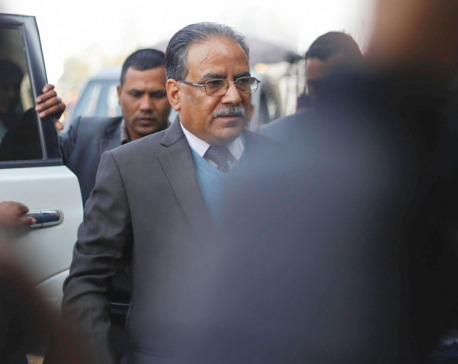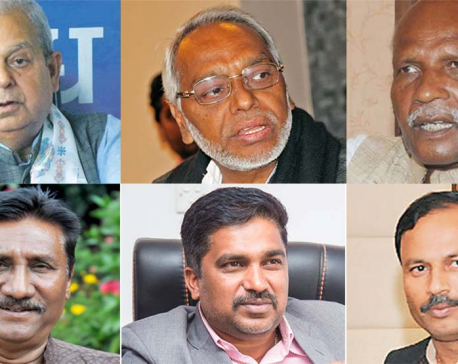
OR
Ex-MP Dhungel’s jailing
The wheels of justice turn rather slowly in Nepal. It has been nearly eight years since the 2010 Supreme Court verdict convicting the murder-accused ex-Maoist lawmaker Bal Krishna Dhungel. Long protected against arrest by influential Maoist leaders, Dhungel was finally apprehended from his Satdobato residence on Tuesday. Dhungel had been leading a semi-underground existence all this time. Even though the Nepali judiciary has repeatedly upheld his murder conviction—with clear proof that he killed Ujjan Kumar Shrestha of Okhaldhunga district in cold-blood in 1998, and not as a part of the larger Maoist war—top Maoist leaders have long maintained that all war-time human rights-related cases should be dealt under the larger transitional justice process. They feared a domino effect: if Dhungel was to be captured and prosecuted today, why, tomorrow they too might find themselves in the dock for this or that war crime. But while their fear was understandable, it was also misplaced. Dhungel’s was a unique case, for in the vast majority of the war-time cases it is extremely difficult to establish facts, and the task gets harder with every passing year: it has been well over a decade since the Maoist guns fell silent.
If the state cannot punish someone convicted of cold-blooded murder, it would be laughable to argue that there is rule of law in the country. Even though Dhungel had been in semi-hiding following the 2010 court order, there were also times when he openly attended public functions and political rallies, in clear sight of the police. Such brazen display of bravado by a murder-convict was not a reassuring sight for Nepalis. It suggested that if you are well connected in Nepal, you can get away with anything, even murder. But while most Nepalis were dismayed, the criminal types were greatly emboldened. This is why Dhungel’s (eventual) arrest is so important, as it suggests that albeit a little late, justice will finally be done—to great relief of the bereaved family of Ujjan Shrestha that has over the years knocked every possible door for justice. Another important message Dhungel’s arrest gives is that criminal activities under political cover will not be tolerated, even when your party is waging an armed insurrection. There are common norms of humanity you cannot cross under any circumstances.
For all these reasons, we would like to urge the top leaders affiliated with various Maoist parties to desist from putting undue pressure, by themselves or through their contacts in other parties, for Dhungel’s release and pardon. Was it possible to pardon him, the Supreme Court would not have halted the 2011 process of ‘presidential pardon’ of Dhungel that was initiated by the Baburam Bhattarai government. In fact, speaking in favor of the murder-convict could be suicidal for the electoral prospects of the top Maoist candidates who are in the fray for the upcoming provincial and federal elections. It will tell the electorate that a decade after giving up arms, the Maoists are still not ready to obey the rule of law and don’t have any faith in democratic norms. Such pressure tactics to free Dhungel will thus rightly be seen as both politically immature and deeply immoral. We expect better of Pushpa Kamal Dahal and company.
You May Like This

PM Dahal says he has less property as he transferred it to the party
KATHMANDU, Dec 17: Prime Minister and Chairman of CPN (Maoist Center) Pushpa Kamal Dahal has clarified that he has less... Read More...

RJPN finalizes candidacy: Who will contest where?
KATHMANDU, Nov 1: Rastriya Janata Party-Nepal has finalized candidacy of member of presidium of the party. ... Read More...

Where does gold come from?
KATHMANDU, Aug 22: With the festive season around the bend, customers are buying gold ornaments to make the celebration more special.... Read More...





Just In
- MoHP cautions docs working in govt hospitals not to work in private ones
- Over 400,000 tourists visited Mustang by road last year
- 19 hydropower projects to be showcased at investment summit
- Global oil and gold prices surge as Israel retaliates against Iran
- Sajha Yatayat cancels CEO appointment process for lack of candidates
- Govt padlocks Nepal Scouts’ property illegally occupied by NC lawmaker Deepak Khadka
- FWEAN meets with President Paudel to solicit support for women entrepreneurship
- Koshi provincial assembly passes resolution motion calling for special session by majority votes






_20220508065243.jpg)






Leave A Comment